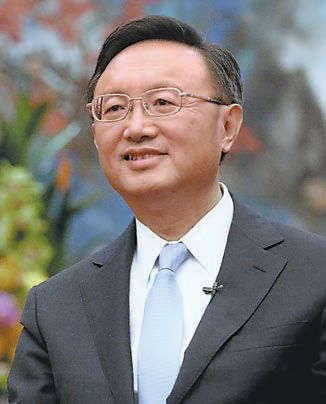Sino-US ties 'gain momentum'
Updated: 2015-09-22 13:08
(China Daily USA)
|
|||||||||
|
State Councilor Yang Jiechi says President Xi Jinping's state visit to the U.S. will address practical cooperation. Xu Jingxing / China Daily |
In an interview with China Daily, State Councilor Yang Jiechi looked ahead to President Xi Jinping's state visit to the US and his attendance at a series of U.N. gatherings. Here is an extract from that interview.
How is the upcoming visit by President Xi different or special from the previous one at Sunnylands, California, in 2013?
This is a state visit, so in every sense it's very important and comprehensive, covering all major aspects of the China-US relationship. Following up on their substantive and productive discussions at Sunnylands, California, and in Beijing's Yingtai, the two presidents will have in-depth discussions this time.
First of all, I believe they will further chart the course of the China-US relationship, particularly the new model of major country relationship. There will also be a lot of discussion on practical cooperation, and substantive results will come out of that. The two countries will also do a lot for the Asia-Pacific region and for the world as a whole.
Do you think China and the US will be able to reach a consensus on how the major power relationship will be advanced in the correct direction?
Internationally, from Afghanistan to the Korean Peninsula, the two countries have worked in coordination with other countries for peace, stability, and development. Particularly, last year there was the joint announcement by China and the US on addressing climate change.
Military ties have been further built, and there is a new visa arrangement that actually facilitates visits by businesspeople and students.
All this shows that a new model of major country relationship will work in the best interest of both countries, and for the rest of the world. What is important is really to adhere to the principle of avoiding conflict and confrontation, respecting each other's core interests and major concerns, and pursuing win-win solutions.
Both countries want to promote their business relationship. Can you brief us on progress on economic cooperation and trade?
The Chinese economy has many facets, and one of them is foreign trade and investment from overseas. The China-US economic relationship has been the bedrock of the progress that we have made. I still believe the business community in the US is very much interested in the Chinese economy, and they see a growing and expanding Chinese economy where there are more and more opportunities for them - not only on the east coast, but also in the hinterland as well.
Of course, for our part, we will do our best to improve the investment and trade environment in China to further our efforts in improving intellectual property rights protection.
Apart from traditional trade, we are talking a lot about trade not only in goods, but in service, too. We have seen a rise in Chinese investment in the US, which is creating jobs. This kind of interaction between the two business communities will serve the best interests of our peoples.
Some are saying that disputes between China and the US, particularly those in the Asia-Pacific region, are forcing some countries to take sides. What's your take on the actual dynamics in this bilateral relationship between Washington and Beijing?
It' actually in the Asia-Pacific area where Chinese and American interests are most closely intertwined, and it is in this area where China and the US interact the most. The two sides have had cooperation in many fields. No country needs to take sides because President Xi said that we are working really for the "community of interests." So if there are friends of China who would like to be friends of the US, or vice versa, both countries should welcome that. We should have more mutual friends.
The relationship between China and the Association of Southeast Asian Nations (ASEAN) is on the way up, not only economically, but also politically. China and the US should work together in more areas. For instance, we are helping Afghanistan to train more diplomats, and we are also helping Timor-Leste with food security. So in various areas, we should really expand our vision and see what can be further done not only on a bilateral basis, but also on a trilateral basis.
The South China Sea and cybersecurity will be high on the agenda, and whenever we discuss the bilateral relationship, human rights are always an issue. What do you think the two sides should do in the specific areas to guarantee that our relationship moves in the right direction?
China has a consistent policy and stance on the South China Sea, but it is also a fact that there are certain disputes regarding the sovereignty over certain islands in the sea. We have adhered to the principles that these issues should be handled through friendly dialogue. China has pursued a dual-track policy, which has been supported by the overwhelming majority of ASEAN countries. That is, the parties directly concerned should handle their territorial disputes through friendly consultation and negotiation, and China and ASEAN countries together should uphold peace and stability in the region.
Let me say that the disputes are those between China and some countries in the South China Sea region. The US is not part of these disputes, and we hope the US does not get involved in these disputes as it has promised. It is important for both countries to stay in close touch, even if they have different perceptions and views. China has made its views on these issues clear. China wants to have the situation handled and ultimately resolved in a peaceful manner.
As for cybersecurity, it is important for all countries. China itself is a victim of hacking. We are firmly against hacking, and we believe that if there is a suspected case, wherever it happens, it should be investigated and handled on a solid, factual basis. China and the US actually can make cybersecurity a point of cooperation between our two countries. We hope China, the US and other countries can work together to work out the rules for cybersecurity in the international arena in the spirit of mutual respect, equality, and mutual benefit.
In regard to human rights, a lot of progress has been made in China. Of course, no country is perfect in their human rights record. China is ready to have more human rights dialogue with other countries, including the US, on the basis of mutual respect.
Do you think we have a mechanism to manage the dispute in the South China Sea?
Yes, I think the dual-track approach is the right approach. At the beginning of the century, China and ASEAN countries signed a declaration of conduct, which stipulates that the parties directly concerned should handle their differences through dialogue and negotiation. The DOC has been implemented to benefit all sides, because it not only encompasses territorial disputes, but also a lot of other things, such as maritime cooperation, and search and rescue.
China has also been active in conjunction with ASEAN countries to pursue, on the basis of consensus, a code of conduct, and I believe the dialogue will be able to reach that agreement.
(China Daily USA 09/22/2015 page13)
- World's oldest male panda celebrates 30th birthday
- Women's development in China contributes to global equality: white paper
- China releases full text of reform plan for ecological progress
- Upgraded combat drone is unveiled
- Villagers scoop up big profits by drying fish
- Food safety a long-term endeavor

 Who accompanies President Xi on foreign visits?
Who accompanies President Xi on foreign visits?-
 Special: President Xi visits the US, attends UN summits
Special: President Xi visits the US, attends UN summits -
 From Iowa farm to White House: Xi's US visits
From Iowa farm to White House: Xi's US visits -
 US buses drive with images of China's pandas
US buses drive with images of China's pandas 
 LFW: Burberry Prorsum Spring/Summer 2016 collection
LFW: Burberry Prorsum Spring/Summer 2016 collection
 Top 10 favorite hotel brands of rich Chinese
Top 10 favorite hotel brands of rich Chinese-
 Top 15 Chinese CEOs to attend US roundtable
Top 15 Chinese CEOs to attend US roundtable -
 House showcasing Sino-American friendship opens to visitors
House showcasing Sino-American friendship opens to visitors
Most Viewed
Editor's Picks

|

|

|

|

|

|
Today's Top News
Young people from US look forward to Xi's state visit: Survey
US to accept more refugees than planned
Li calls on State-owned firms to tap more global markets
Apple's iOS App Store suffers first major attack
Japan enacts new security laws to overturn postwar pacifism
Court catalogs schools' violent crimes
'Beauty of Beijing's alleys akin to a wise, old person'
China makes progress fighting domestic, international cyber crime
US Weekly

|

|









